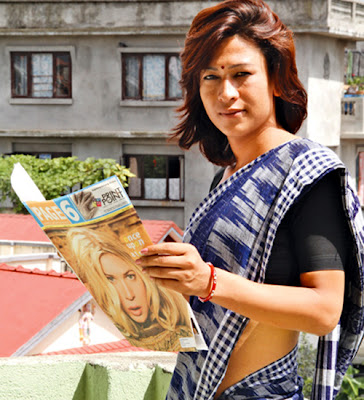There has been little opposition to the decision by Pakistan's Supreme Court to allow a third gender category, apart from male or female, on the national identity card. The BBC's Aleem Maqbool meets transgendered people in Karachi buoyed by the ruling, but sceptical about whether it can really end the isolation they face.
In the back streets, in a squalid neighbourhood of Pakistan's largest city, is a tiny, shabby apartment.
It is where we find "Shehzadi" getting ready for work.
Wearing a bright yellow dress, and scrabbling around her make-up box, she is doing her best to cover up her decidedly masculine features.
Shehzadi is transgendered: physically male, but psychologically female.
"When I was about six or seven, I realised I wasn't either a boy or a girl," Shehzadi says.
"I was miserable because I didn't understand why I was different. It was only when I met another 'she-male' that I felt peace in my heart and my mind."
Like so many other of the estimated 50,000 transgenders in Pakistan, Shehzadi left home as a teenager, to live with others from the same community.
"I'm happy being with other transgenders, but there are many problems," Shehzadi says. "People don't understand, and they abuse us. It's hard to get somewhere to live, or even to move about normally. I get teased when I stand and wait for a bus."
Separate identity Shehzadi also shows us her ID card. She is unhappy that it says "male."
But this is something that should soon change.
Remarkably for a conservative country like this, Pakistan is about to introduce a third gender category on its national identity cards.
Continue reading the main story
“Start Quote

Transgenders wanted recognition for their community. Why not reflect them as having a separate identity ”
Brigadier Ehsan ul Haq "Previously, we were having two categories, male and female, for registration," says Brigadier Ehsan ul-Haq, who is in charge of the national database and registration authority in Karachi.
"But this community agitated for a separate identity of their own. They went to the Supreme Court, the court agreed and we will implement it."
Brigadier Ehsan says that to his knowledge there has been no opposition to the ruling, either within the registration authority or outside it.
"I personally feel it is a good decision by our highest court," he says. "Transgenders wanted recognition for their community. Why not reflect them as having a separate identity if it is biologically so?"
The reasons for a relative lack of opposition are complex. Despite the discrimination they face, transgenders have long been accepted as part of the fabric of Pakistani society.
Throughout the Indian sub-continent they have occupied a unique position since the era of the Mughal empire in the 16th Century, when they were given special roles in the royal court.
Pakistan is a Muslim nation and many will note that in Saudi Arabia, transgendered people were given the special role of guarding the Prophet Muhammad's tomb, as they were seen as exemplary devotees with no family ties.
Government jobs Although recognising the community as having its own gender will not solve all of the transgenders' problems, Pakistan's Supreme Court has made further recommendations.
Commonly in Pakistan, transgenders have either been entertainers, or sex workers, or beggars.
 The court ruling says transgenders should be allocated a certain number of government jobs
The court ruling says transgenders should be allocated a certain number of government jobs The only contact most Pakistanis have with members of the community is at traffic lights across the country, where they tap on car windows, begging for money.
But Pakistan's Supreme Court now says that transgenders should also be allocated a certain number of government jobs.
It specifically recommended they be appointed as tax collectors to utilise their "special skills".
Those special skills are already on display in Clifton one of Karachi's most affluent neighbourhoods.
There Shehzadi joins a group of theatrically dressed, heavily made-up transgenders can be seen sometimes strutting down the wide, quiet, tree-lined streets.
"We knock on the doors of people who haven't paid their taxes," she says.
"We tell them to pay up, but there are some who don't, so we stand on their doorstep and give them trouble and make a spectacle. Then to stop us attracting attention, they pay. I love the job, life's going well!"
The experiment has been judged something of a success by the local authority, too, with Shehzadi's team collecting large amounts of unpaid dues.
Just a handful of transgenders have government jobs at the moment. For the vast majority, finding work is still tough.
It could just be that in Pakistan the lot of this isolated and often ridiculed community might just be getting a little bit better.
But in a moment of reflection, Shehzadi tells us of the things which can never be resolved through any kind of legislation.
"However much we say we are a close community, and call each other 'sister' and 'mother' it is still a lonely existence."
"Most don't have contact with their families, and, of course, they don't have children," Shehzadi says.
"Getting jobs and ID cards is great, but when I die, I know the community will have a party, spend all my money, and then it will be as if Shehzadi never walked on this earth."
"That will always be the reality of our life."



